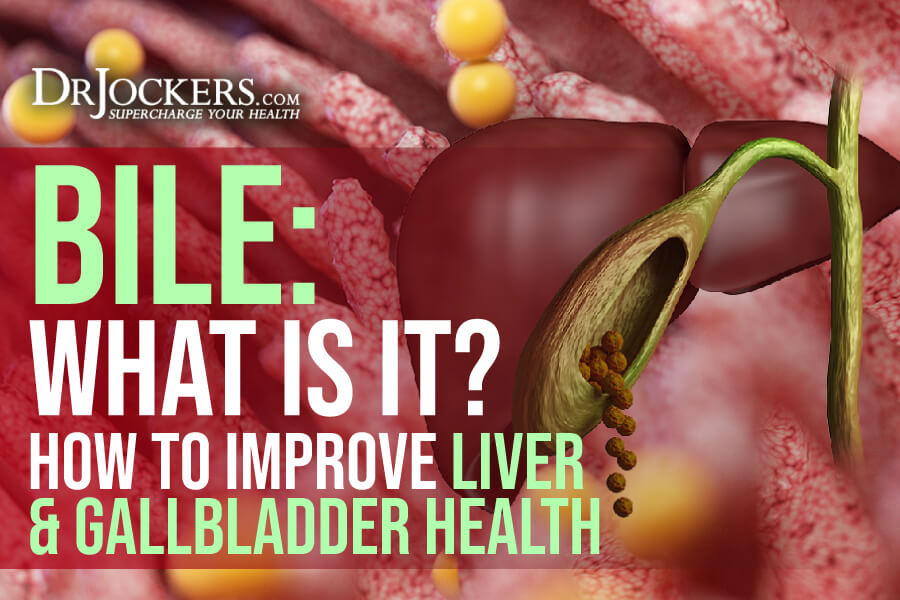 Bile: What is it?
Bile: What is it?
The liver and gallbladder are involved in the formation of bile. Bile is primarily well-known as a digestive secretion that helps to digest fats. Bile does way more than this however and is very important for overall health. In fact, if you are facing health challenges involved with digestion, you might be dealing with a bile production issue.
In this article, I am going to break down the functions of bile, why they are important for overall health, and how to make sure your liver and gallbladder are working properly to produce it.
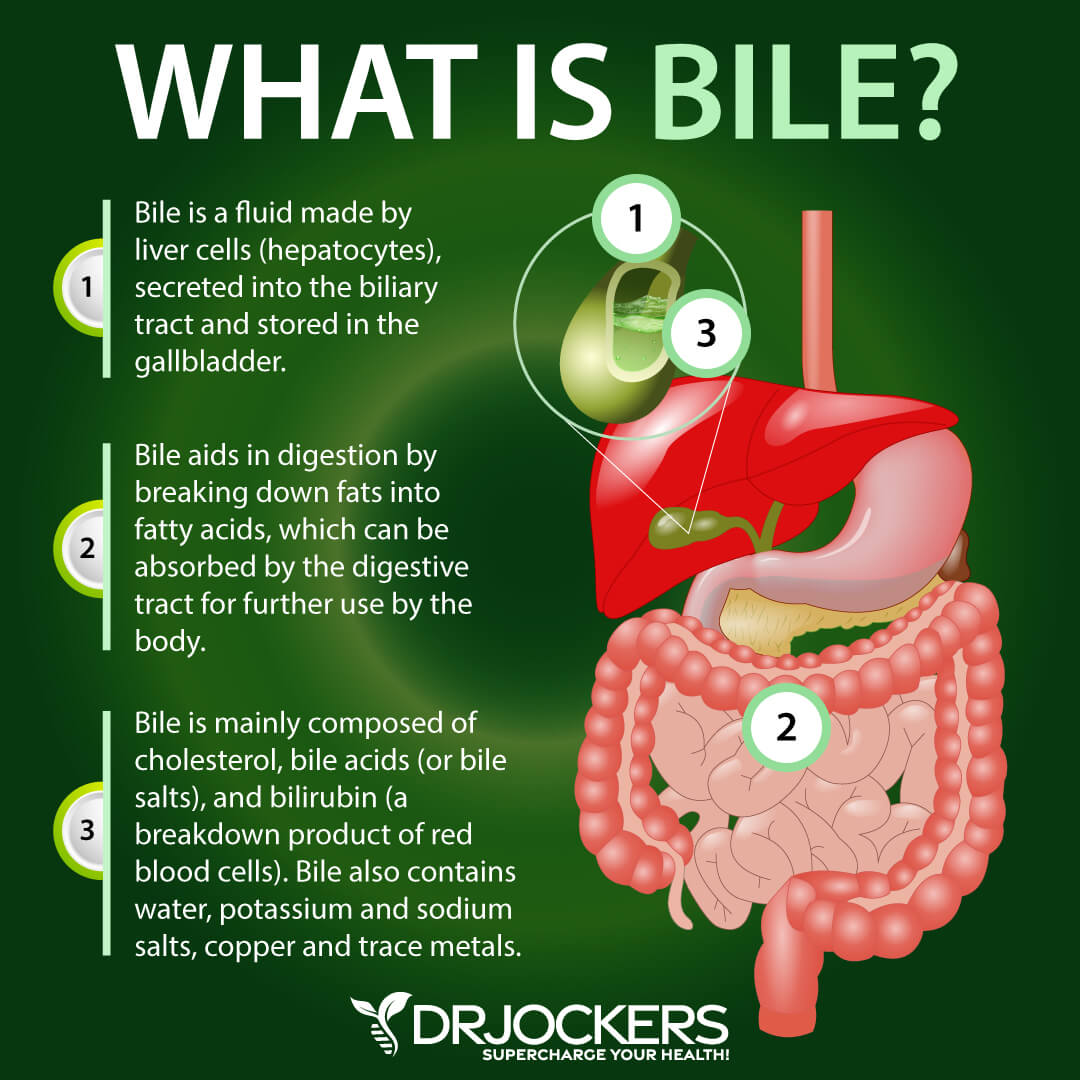
Liver & Gallbladder Functions
The liver has many functions. It works to filter toxins from the body, store energy and nutrients, and produce bile for fat digestion. This is a small list of roles the liver serves. In reality, the liver does many things that are crucial for overall health. This may be why in some cultures the liver is seen as the most important organ in the human body.
The gallbladder on the other hand has a much more limited role. While bile is produced in the liver, it is stored in the gallbladder in quantities of about 50 mL to be released after we consume a meal. The combined role of the liver and gallbladder helps to ensure we are properly metabolizing fats and excreting unwanted toxins from the body.
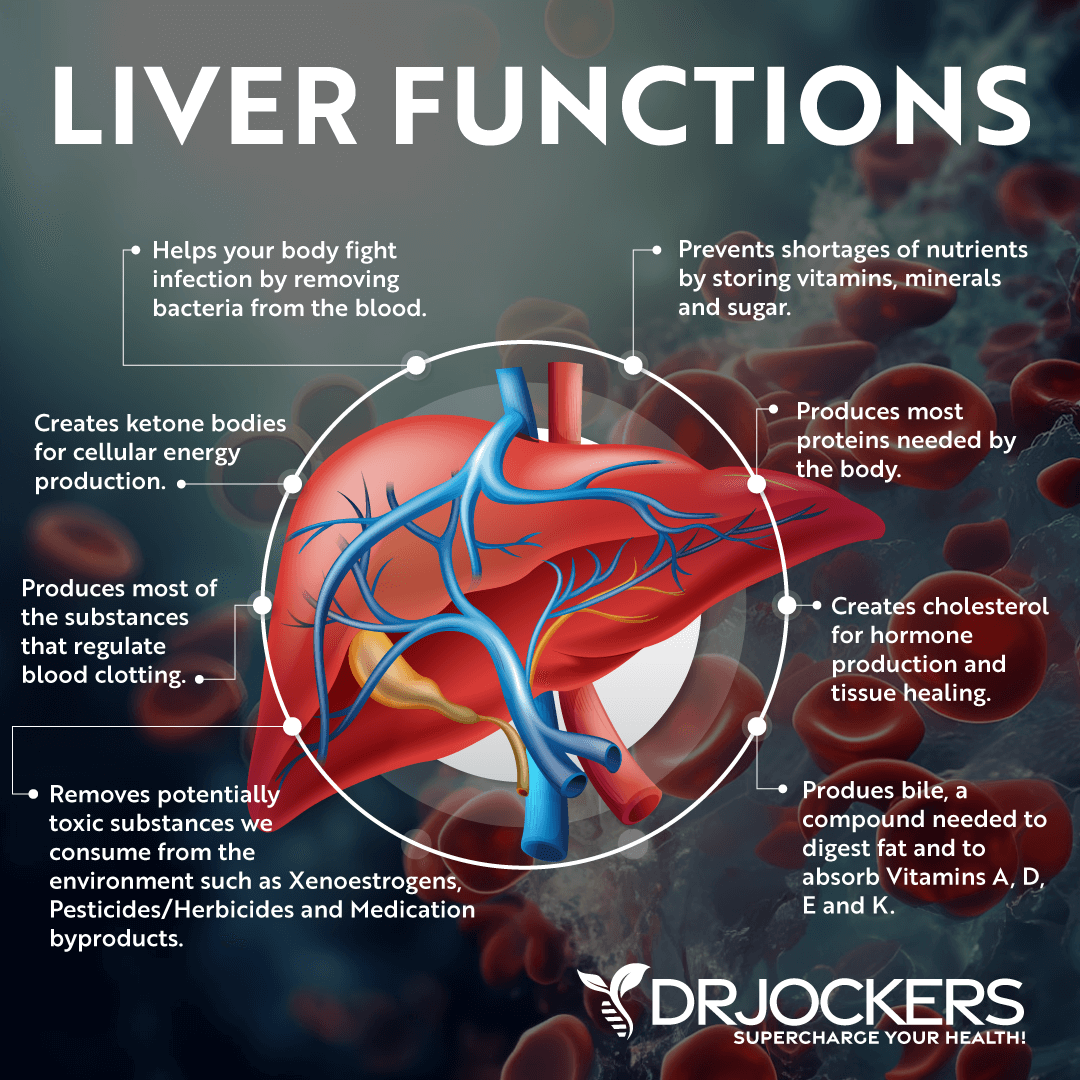
What is Bile?
Bile is a greenish-brown liquid primarily made of cholesterol, bile salts, and bilirubin. It is most commonly known as a digestive juice that emulsifies fats for absorption in the small intestine. As we will talk about in a moment, the proper digestion of fats is important for many other processes that occur in the body. If it is not being released properly or we develop blockages in the gallbladder, then many problems can occur.
In addition to aiding in the breakdown and absorption of fats, bile also contains waste products that are passed through the intestines and released through bowel movements. So, with just this information, you may be able to make the connection that poor bile flow can result in malnutrition and the accumulation of toxins in the body.
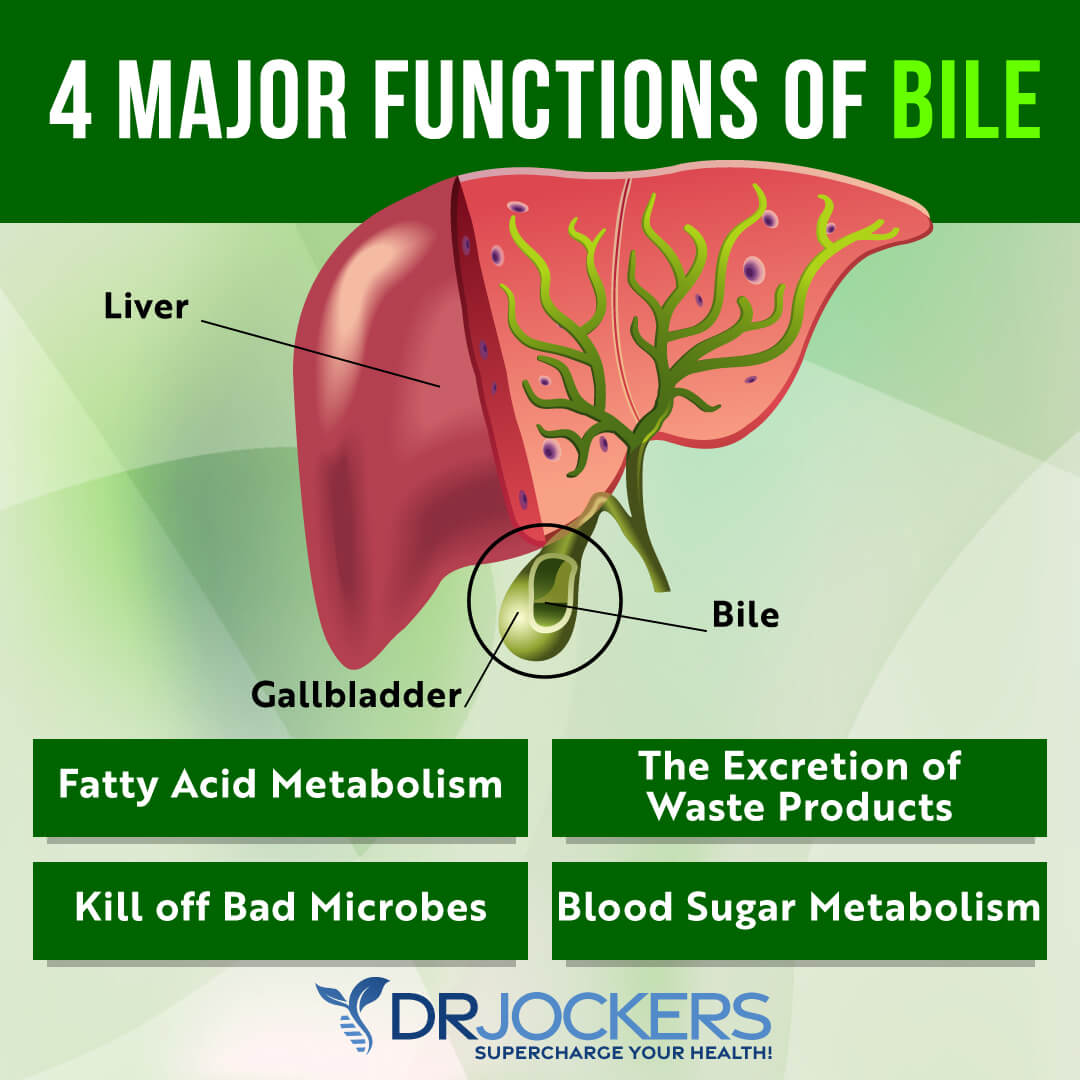
4 Major Functions of Bile
The fundamental functions of bile have been laid out already, but it is important to understand the implications of proper bile flow to truly understand its importance. Digestive issues can lead to things like poor nutrient absorption, unwanted bacterial growth in the digestive tract, inflammation in the gut, and ultimately conditions like leaky gut syndrome.
Leaky gut is an inflammatory condition of the gut that results in undigested food particles crossing into the bloodstream. Once these particles cross the intestinal barrier, they cause dysregulated immune activity. It is this dysregulated immune activity that ultimately leads to autoimmune conditions in the body (1). Autoimmunity can manifest in many ways including thyroid disorders, rheumatoid arthritis, and lupus if left unaddressed.
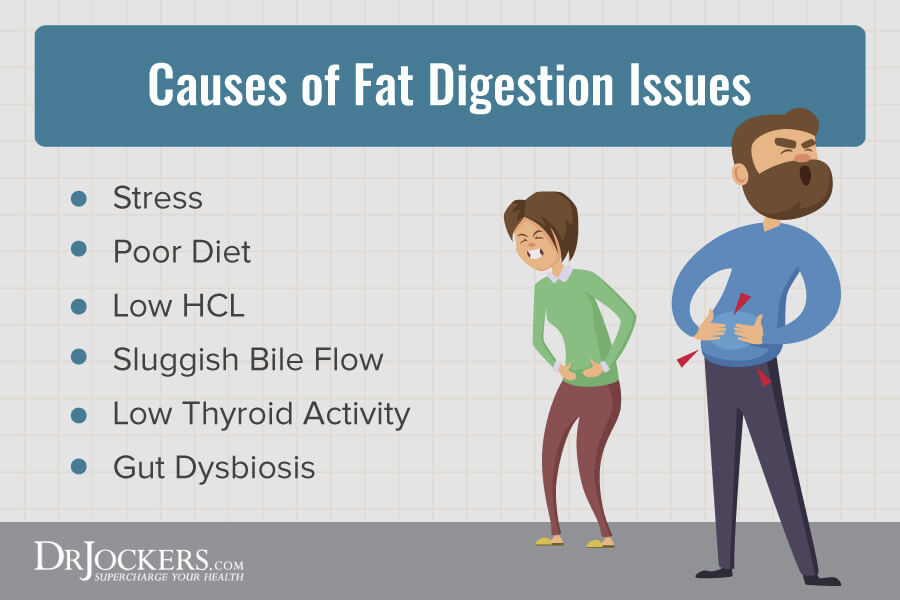 Fatty Acid Metabolism
Fatty Acid Metabolism
First and foremost, bile emulsifies fats. Fats in their unaltered form are actually of little use to the body. If they are not emulsified, then they pass through the digestive tract and often cause symptoms similar to IBS such as chronic diarrhea.
Emulsified fats also act as vehicles for fat-soluble nutrients like vitamins A, D, E, and K. These nutrients in themselves play many roles in the body including protecting the arteries from calcification, improving immune system function, and more.
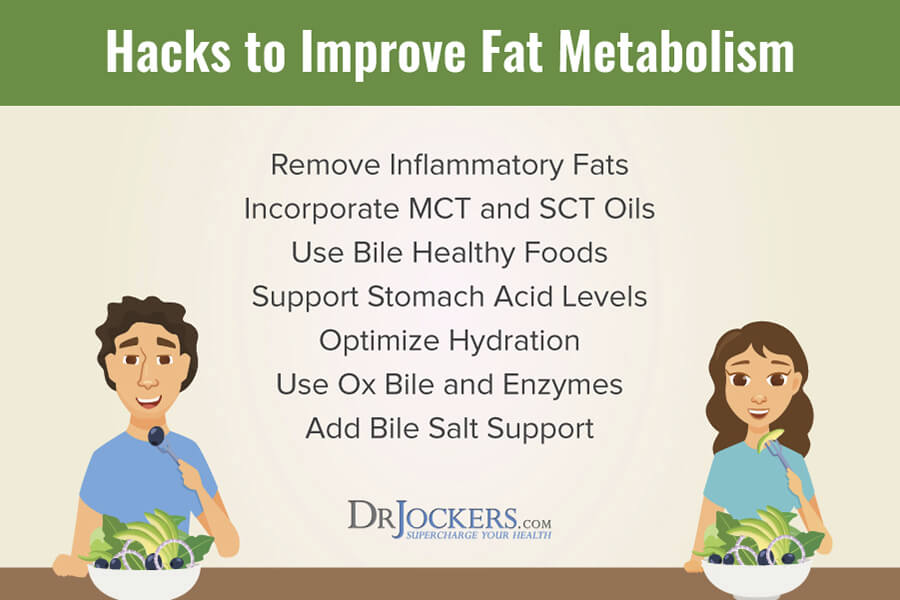
Kill off Bad Microbes
The importance of the microbiome is something that we are still discovering more about every day. In fact, there are entire research funds dedicated to analyzing the makeup of healthy and diseased individuals (2).
The bacterial makeup of your mucosal membranes can predict your risk of diabetes, heart disease, cancer, and even your risk of succumbing to certain neurological conditions. This is because different types of bacteria assist in the production of nutrients and neurotransmitters that can alter your emotional state (3, 4).
Bile, similar to stomach acid, helps to regulate our microbiome by killing off unwanted pathogens that can make their way into our bodies.
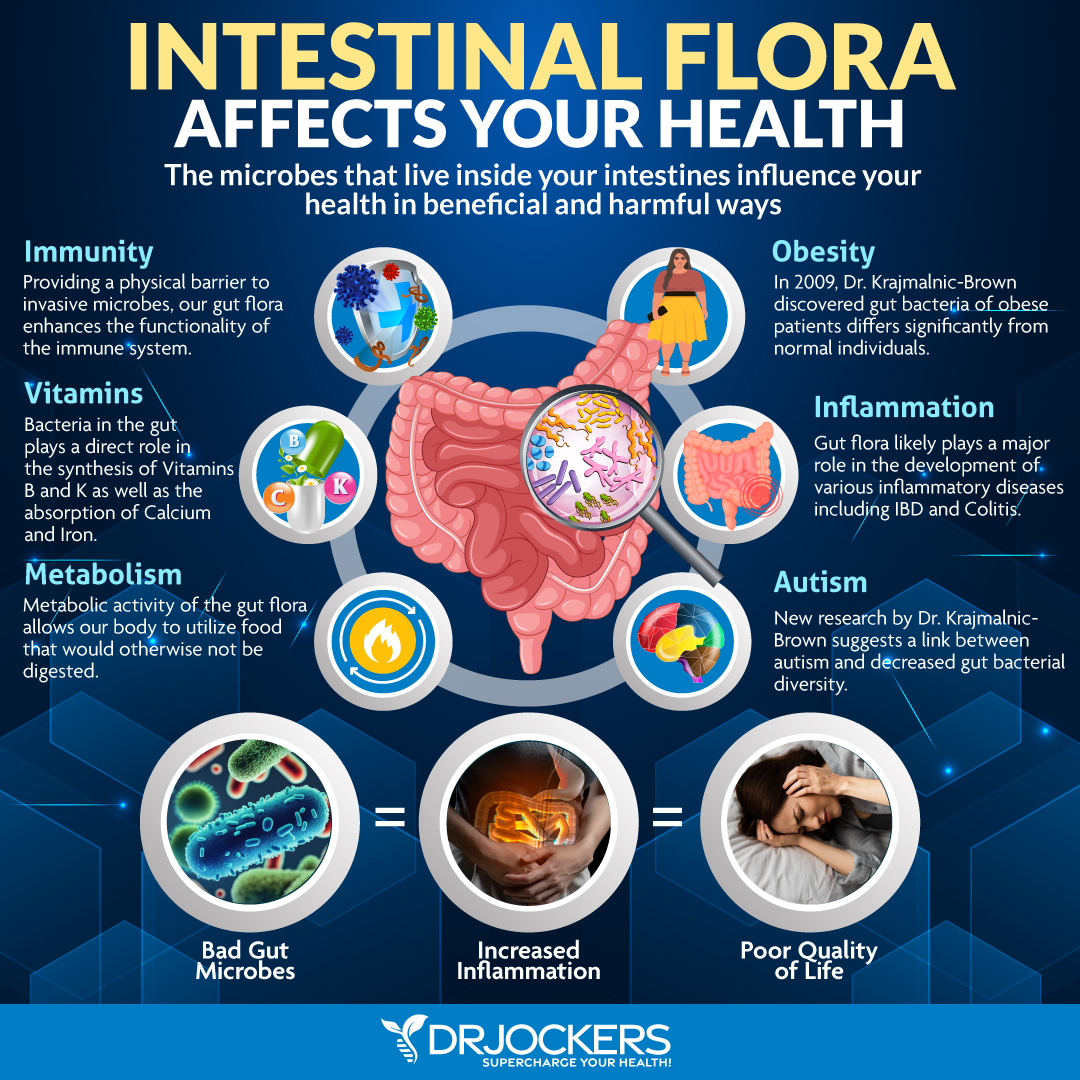
Excretion of Waste Products
The body gets rid of toxins through various passages in the body. These include the urine, sweat, breath, and bowel movements. As the liver filters out toxins from the body, they are primarily released in fat-soluble or water-soluble form.
Water-soluble toxins are primarily excreted through the urine while fat-soluble toxins are released in the bile to be passed through the bowels. Bile also helps to stimulate peristalsis. Peristalsis is a wave-like muscular action that propels food matter and waste through the intestines.
If bile is not being released properly, then this critical detoxification pathway will not be functioning as it should. Built-up toxins can contribute to unwanted bacterial growth, chronic inflammation, weight gain, and several associated consequences.
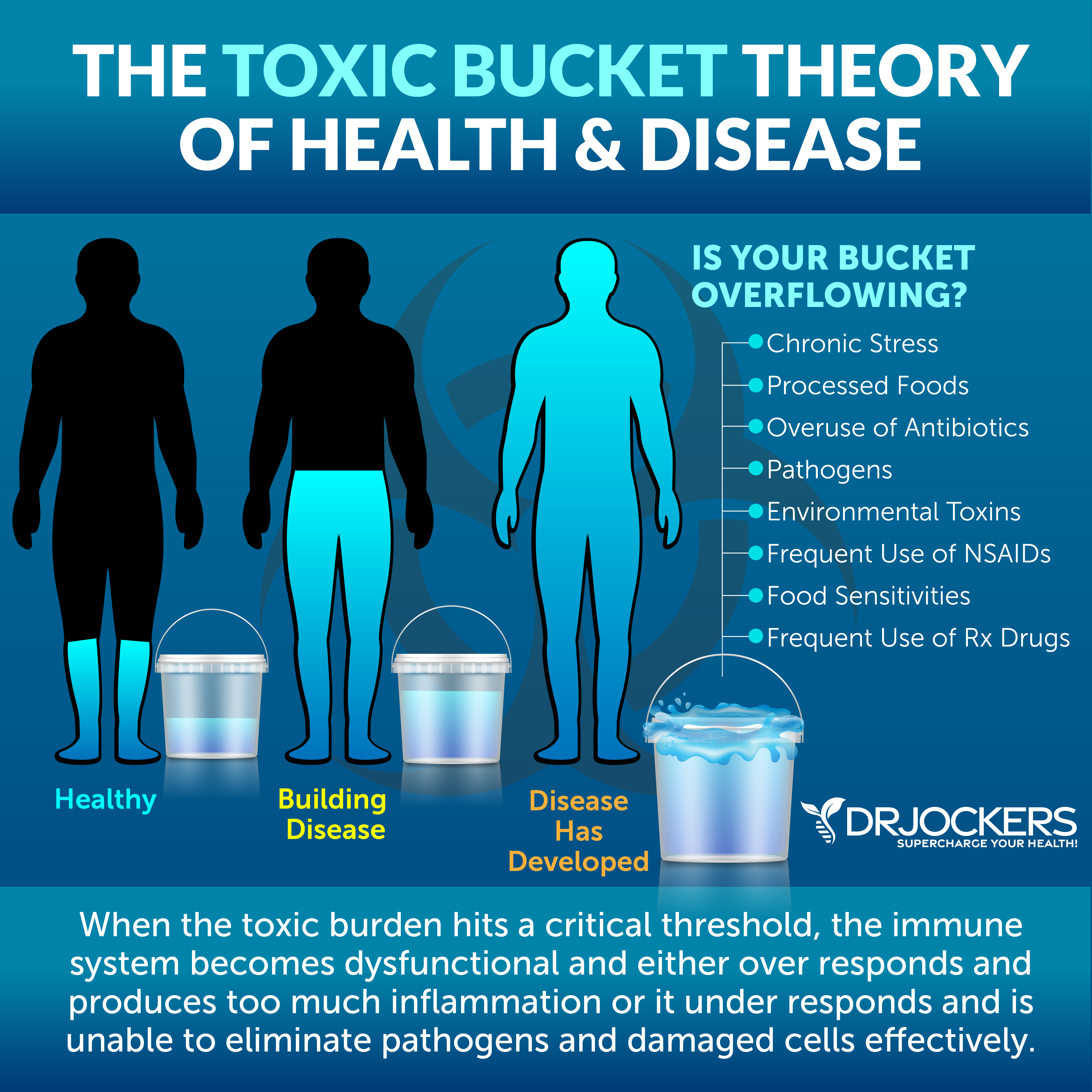
Blood Sugar Metabolism
Another less talked about mechanism is that it helps to keep blood sugar stable. Having a healthy blood sugar balance is critical for maintaining stable energy levels, emotional stability, and maximum brain performance.
Studies have shown that a poor metabolism of fats contributes to blood sugar instability issues (5, 6). In addition to this, bile actually stimulates two very important receptors referred to as FXR and TGR5. Stimulation of these receptors helps to regulate both fat and carbohydrate metabolism as well as the inflammatory response within the body (7, 8).
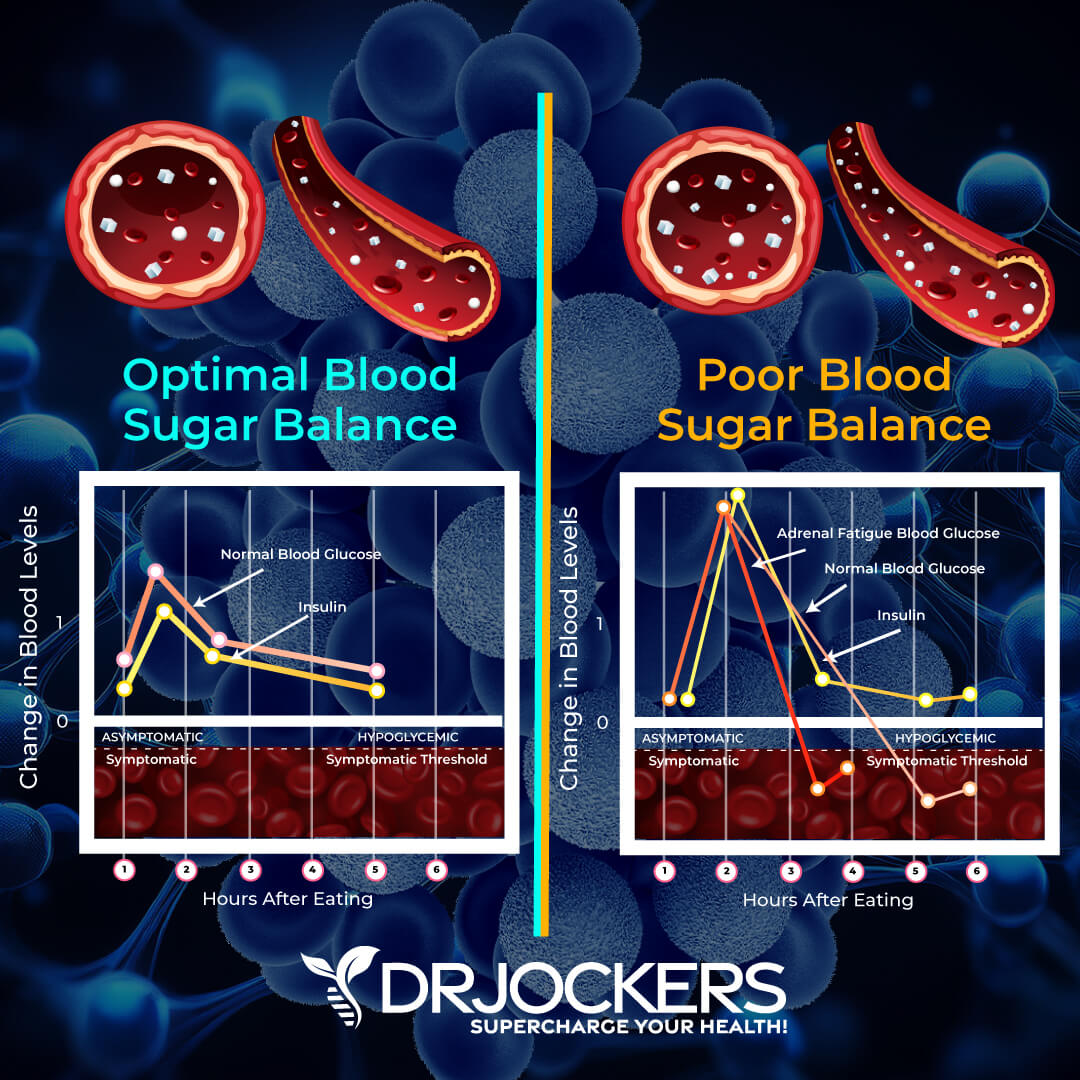
Symptoms of Poor Bile Flow
As you can see, proper bile flow regulates many important processes in the body. If it is obstructed for any reason, several complications can manifest including:
- Weight Gain
- Low Energy
- Emotional Instability
- Digestive Complications
- Headaches and Migraines
- Fibromyalgia
- Inflammatory Skin Conditions (acne, eczema, rashes)
- Chemical Sensitivities (due to toxic build-up)
- …and more
The remainder of this article will focus on strategies to improve liver and gallbladder function so that you can improve bile flow and prevent these unwanted side effects.

Improve Liver Function
First and foremost, bile production begins in the liver. We must ensure the liver is functioning optimally to reduce toxic exposure, improve toxin elimination, and ultimately improve digestion. The liver is under constant stress from the air we breathe, the water we drink, and the food we eat.
Additionally, if you are under stress, have bad gut microbes, or have poor relationships this can overload your liver and lead to poor bile production as well. Here are the steps to improve liver health.
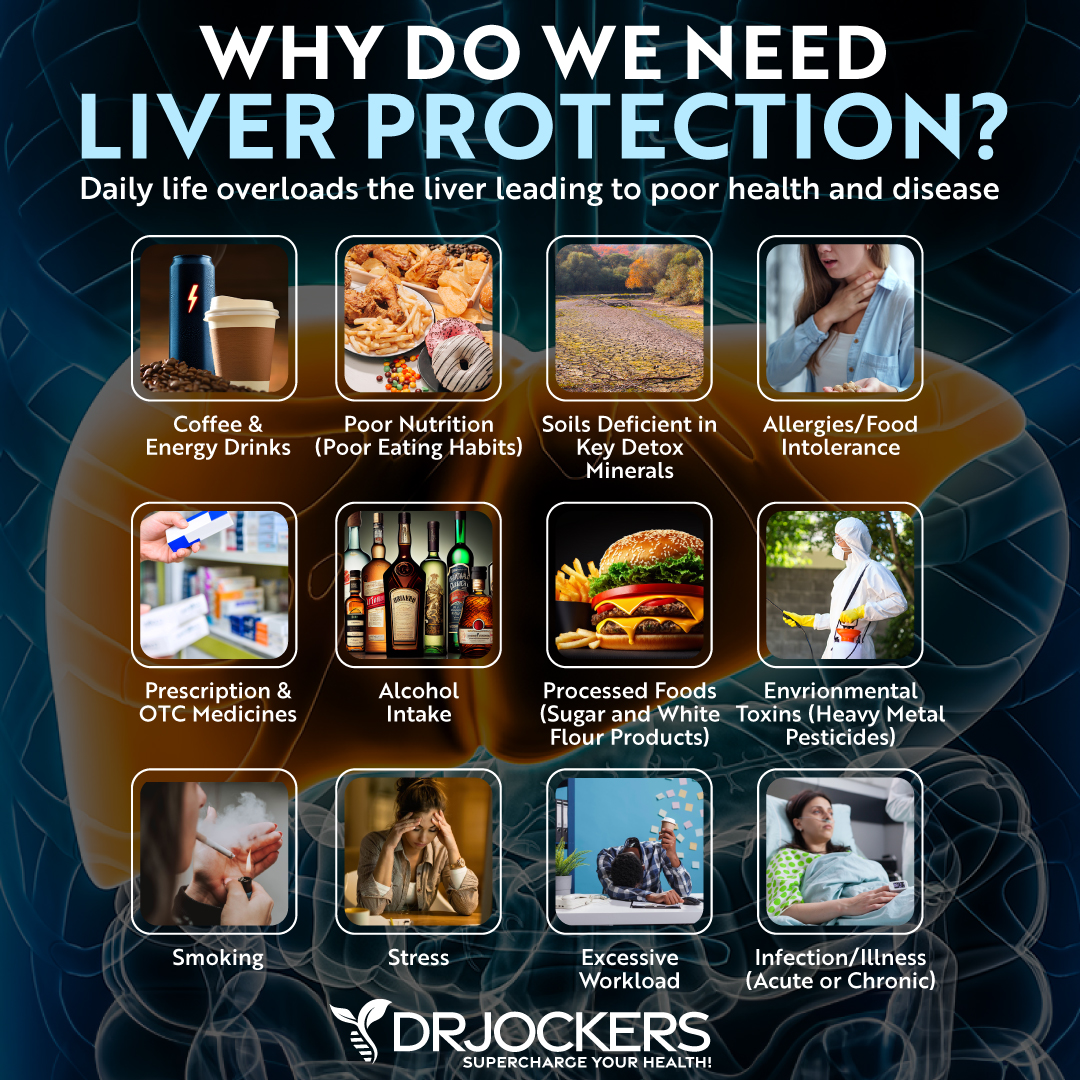
Avoid Toxins
In today’s society, we are constantly bombarded by toxins that were absent from our environment for thousands of years. While industrialization has brought many great innovations for a growing population, it has also introduced harmful elements that we must account for.
In the diet, these include things like pesticides, heavy metals, xenoestrogens, artificial hormones, and unnatural processed food ingredients.
Start by shifting your diet towards one that favors organic, whole foods. The bulk of your diet should be nutrient-dense vegetables and antioxidant-rich herbs and spices. Next, load up on healthy fats like avocados, coconut products, olives and olive oil, and (my favorite) butter or ghee from pasture-raised cows.
For more information on this style of eating, I have an excellent introductory guide here: 5 Benefits of a Healing Diet
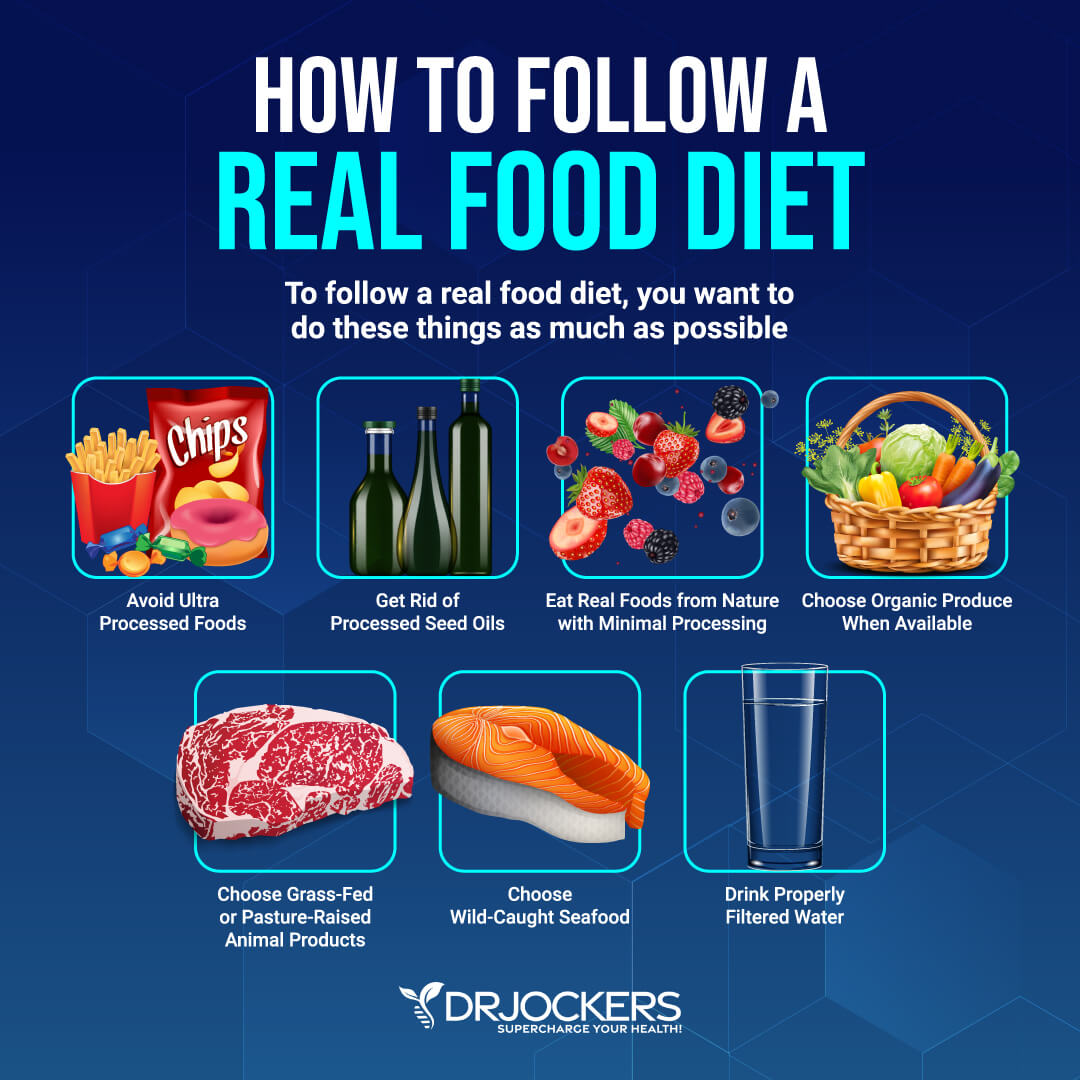
Foods for the Liver and Bile Flow
After eliminating the bulk of toxins from our diet by making better food choices, we can focus on incorporating foods that are nourishing to the liver. These are foods that provide valuable nutrients that assist in detoxification and even help to stimulate the formation of bile.
Some of the best foods for this include pasture-raised liver, cruciferous vegetables, leafy greens, green tea, spirulina, chlorella, and organic berries.
For my complete list of the best foods for your liver, I have put together a graphic below.
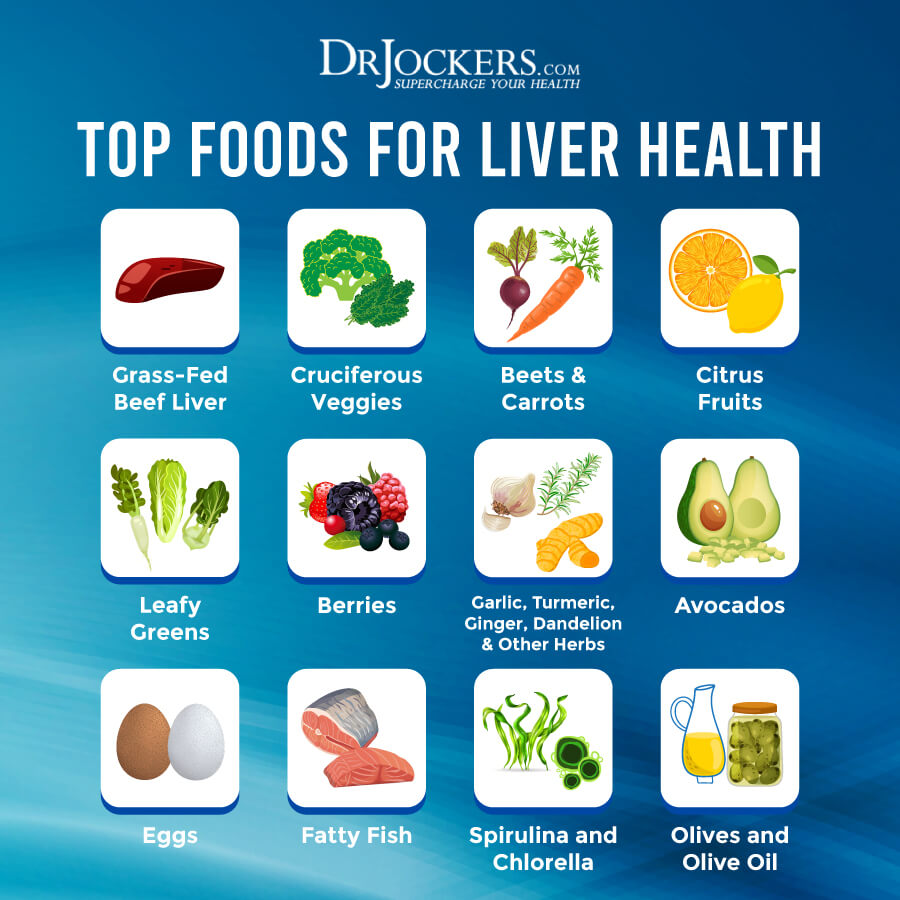
Boost Detox Pathways
As toxins are filtered through the liver, they must pass through three phases that all require specific nutrients to occur. This is important because toxins are usually altered and converted into forms that are less toxic (or even beneficial).
Three phases of this process require certain nutrients to be present:
Phase I is regulated by the Cytochrome P50 enzyme and is the first step in converting toxins. This phase requires adequate amounts of amino acids, vitamins A, B2, B3, C, E, folate, iron, calcium, copper, zinc, magnesium, and selenium.
Phase II converts the toxins from Phase I into water-soluble forms that are easier to excrete. This phase is highly dependent of methylating agents, glutathione, and sulfur.
Phase III is the final conversion where toxins are diverted for excretion in either the bile or urine. This is an enzymatic process that requires the nutrients mentioned in the previous two phases. Foods that stimulate bile flow and healthy sources of fiber both assist with this phase as well.
The top liver foods mentioned above all assist with these phases, given that you consume a variety of them regularly. Bile-stimulating foods and best fiber sources will be discussed shortly.
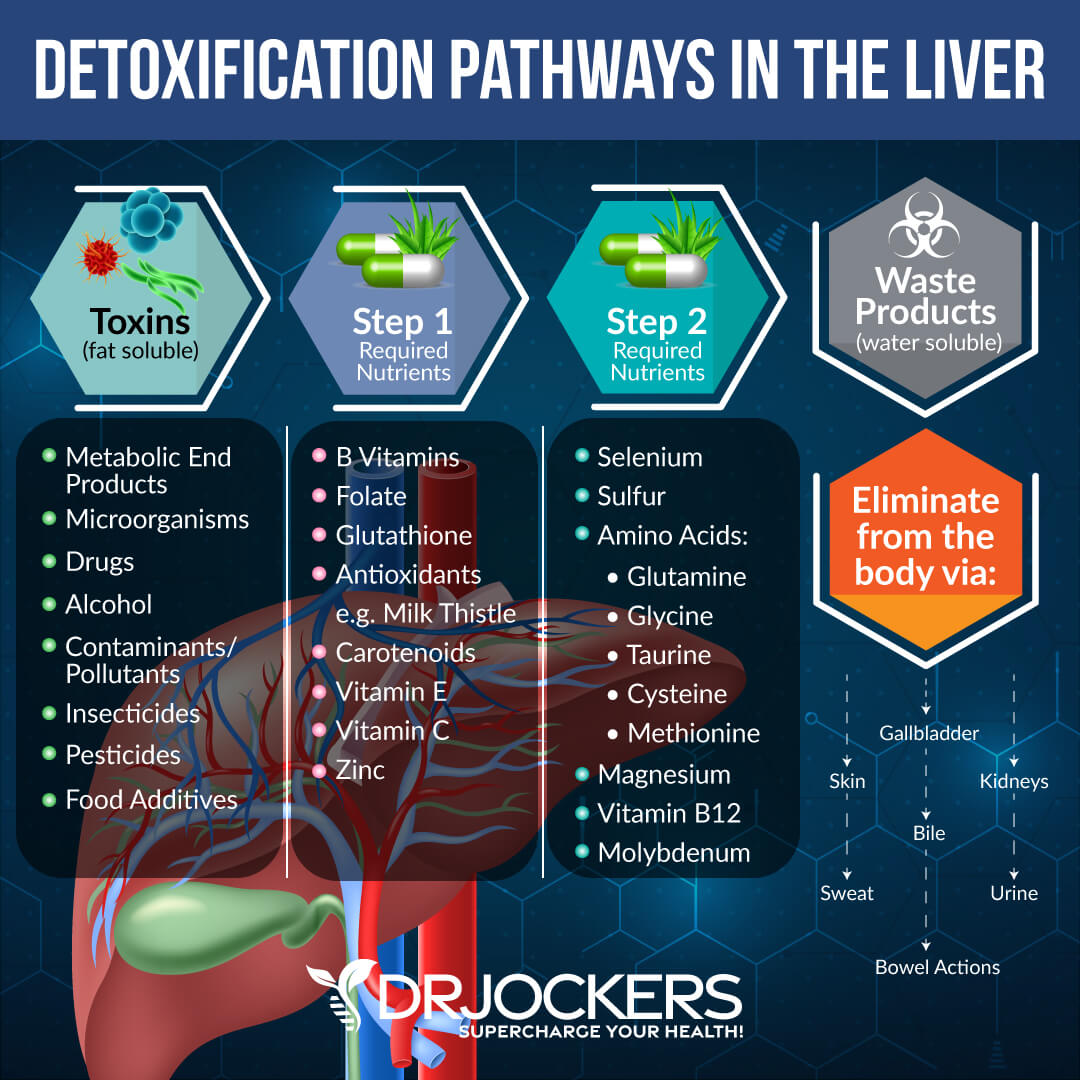
Boost Glutathione
Glutathione is the master antioxidant and detoxifier of the body. By boosting this valuable element within the body, we assist with liver function by reducing toxic load and directly assisting in phase II and III detoxification.
There are also a great number of other benefits of boosting glutathione levels. These include slowing the aging process, improving energy levels, boosting the immune system, and supporting mental clarity.
The best strategies to boost glutathione include:
- Consuming the liver-supporting foods outlined above.
- Engaging in short-duration, high-intensity exercise
- Using glutathione-boosting agents
- Supplementing with acetylated or liposomal glutathione
Clinically, one of my go-to glutathione-boosting supplements is ThyroLiver Protect. It contains selenium, milk thistle, alpha-lipoic acid, and n-acetyl-l-cysteine which all play important roles in supporting the body’s ability to create glutathione.
Balance Hormones
Something I see a lot clinically is elevated estrogen levels in both men and women. While estrogen is a critical hormone, we have many toxins in our environment that mimic estrogen and promote a condition called estrogen dominance.
Estrogen dominance is when estrogen levels become highly expressed relative to other sex hormones. When this happens, the liver is responsible for converting and eliminating these estrogenic metabolites. This can quickly become burdensome on the liver and contribute to side effects illustrated below.
Consuming cruciferous vegetables can partially assist with the elimination of excess estrogens in the body through the action of a compound called diindolylmethane (DIM). In more severe cases, using a concentrated form, such as EstroProtect, can be extremely beneficial.
Estrogen-mimicking chemicals can come from many sources. Check out the graphic below and strive to minimize your exposure to the things listed. In most cases, there are great alternatives to things like plastics, cosmetics, and household cleaners that do not contain hormone-disrupting ingredients.
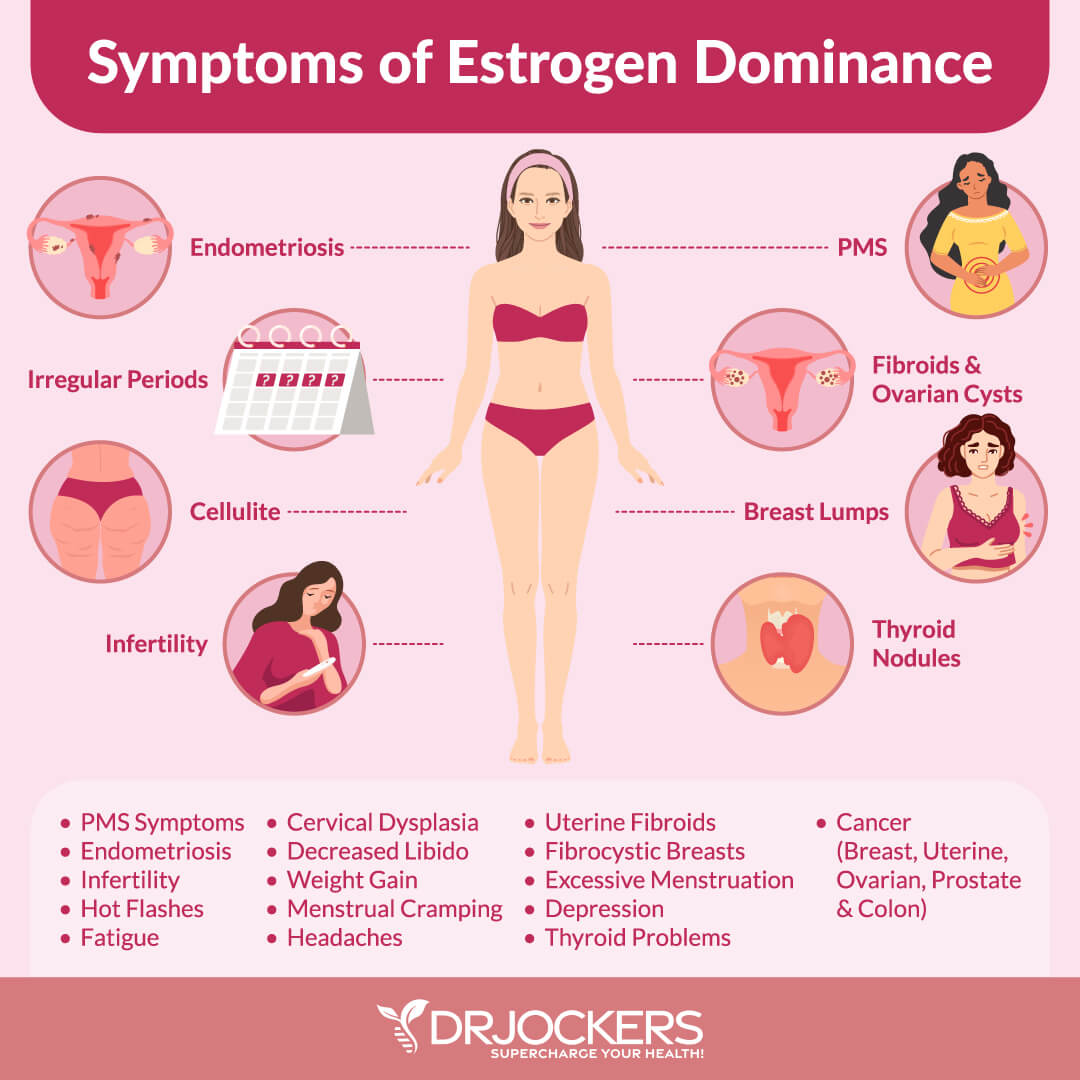
Improve Gallbladder Function
Now that we’ve emphasized the importance of the liver in optimizing bile flow, strategies can be incorporated to support the gallbladder. Since these structures heavily rely on each other, they cannot be addressed in isolation.
Supporting the gallbladder ultimately comes down to ensuring bile is released as it should. If you have an obstruction, biliary sludge, or have had your gallbladder removed, then these strategies will still be very important.

Hydration
If you are chronically dehydrated, then it is possible that your bile will not have the viscosity it needs to flow well. If bile becomes thick and sludge-like, this will predispose you to poor digestion and potentially the development of gallstones down the road.
Start the day by super hydrating with 16-32 ounces of reverse osmosis water to flush out the digestive tract and kidneys. Additionally, aim to consume at least half but up to your full body weight (in lbs.) in ounces of water daily. For example, a 150 lb. individual would consume between 75-150 ounces of water per day.
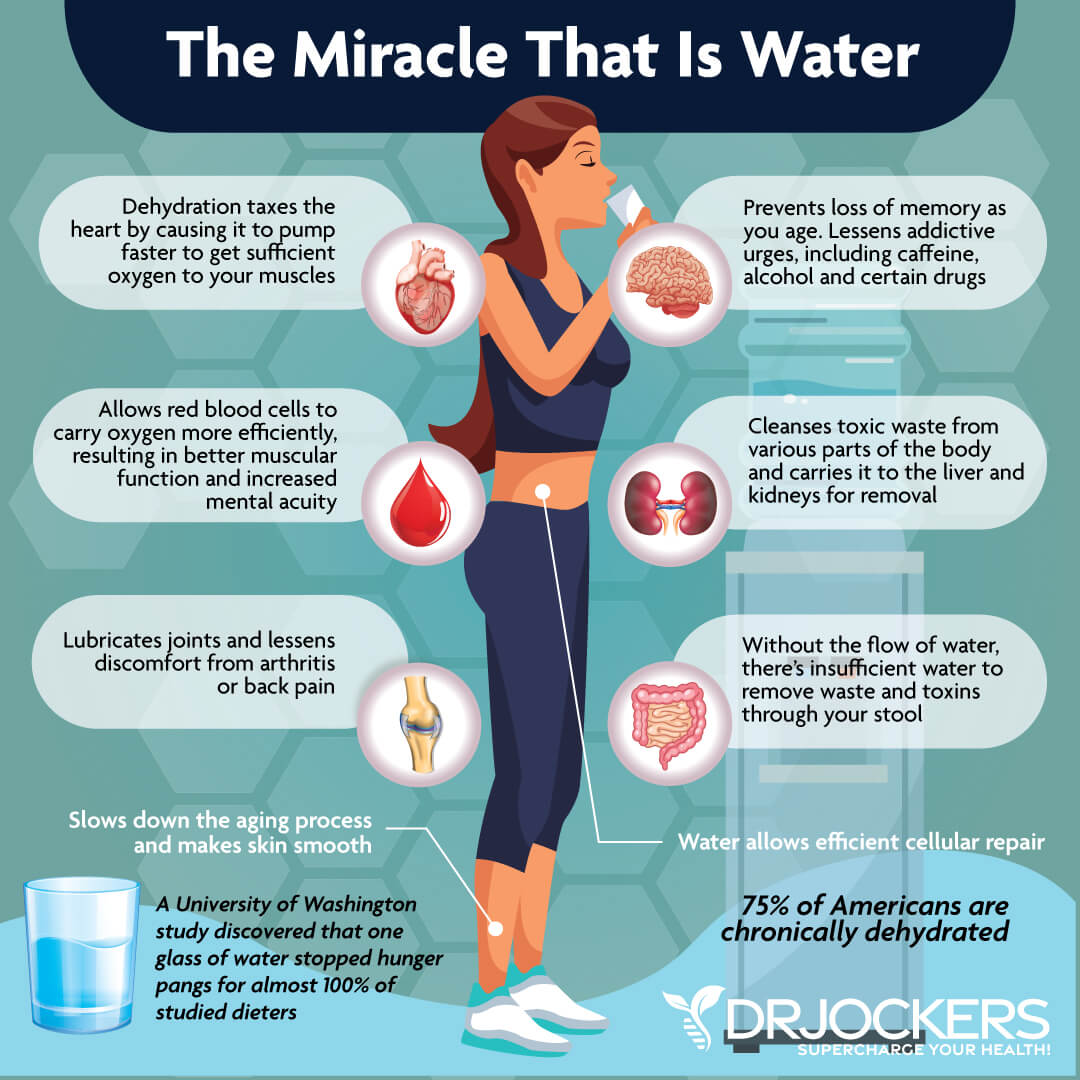
Foods for Improved Bile Flow
Next, consume foods that stimulate bile flow. Many of the foods outlined as being healthy for the liver will provide this effect. Some of the best foods for stimulating bile flow include:
- Organic acids from apple cider vinegar, lemons, and limes
- Bitter Herbs (parsley, cilantro, dandelion, milk thistle)
- Warming spices like ginger, turmeric, and cinnamon
- Prebiotic foods like artichokes, radishes, asparagus, garlic, beets
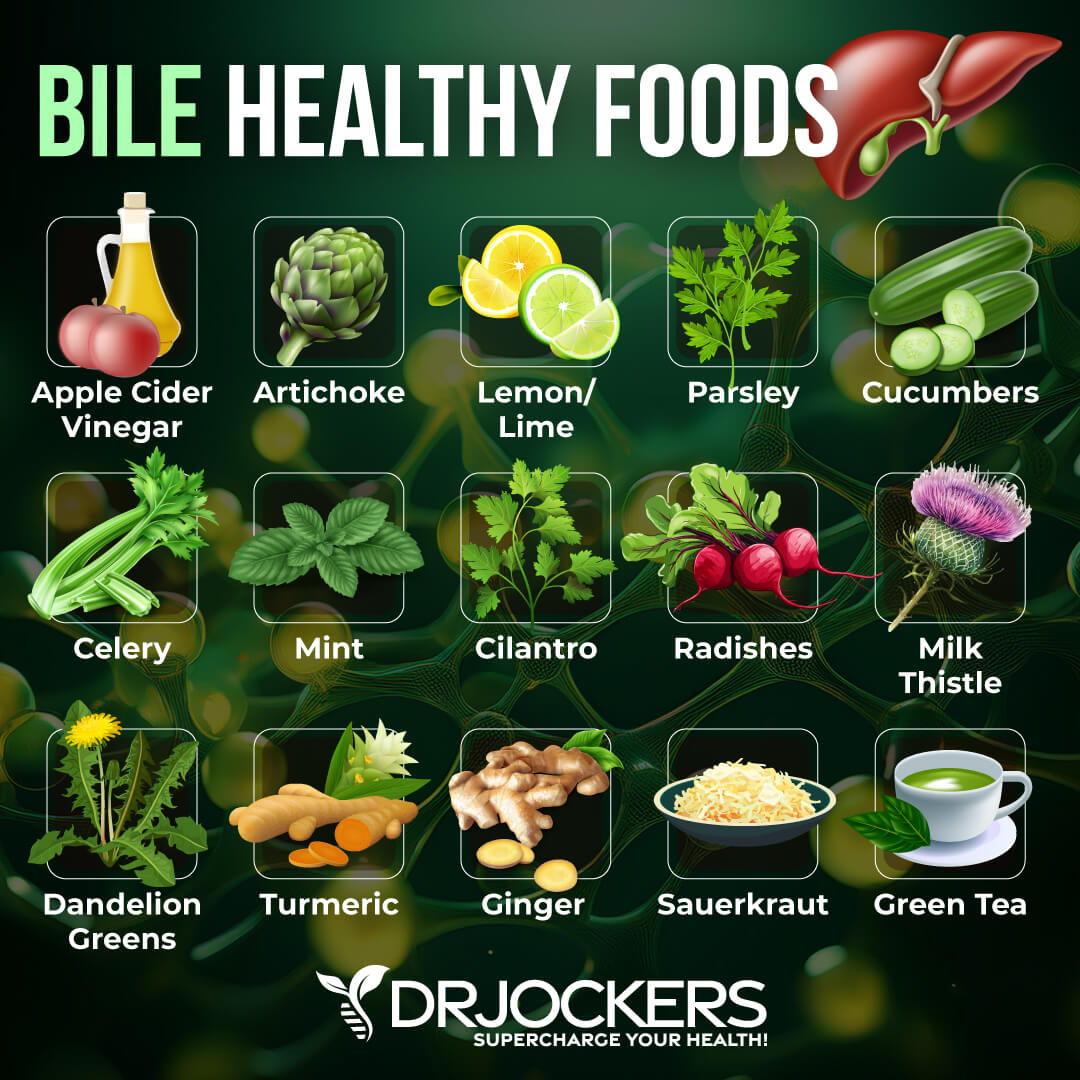
Intermittent Fasting
Every time you eat, your gallbladder will release bile. Taking breaks from eating, allows more time for bile to become concentrated.
Additionally, this fasting period boosts liver health by allowing more time for detoxification processes to occur. By adding in the hydration practices outlined above, you go a long way in improving liver and gallbladder function.
Begin with a 12-hour fasting window between dinner and breakfast. Once you are adapted well, try increasing this window by 2 hours every few weeks until you reach a fasting window of 16-18 hours, this is the sweet spot for most people.
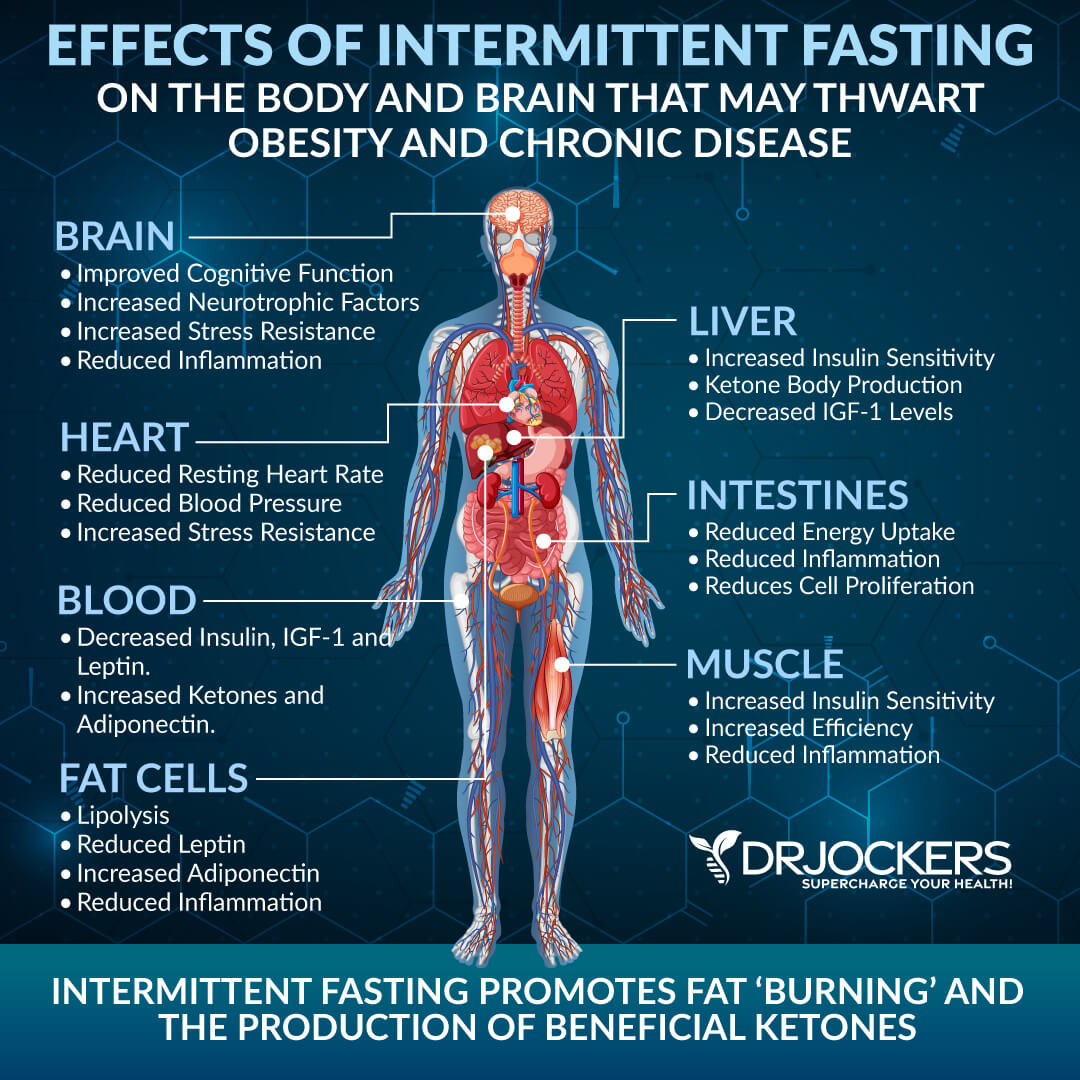
Ox Bile and Bile Salts
If you are constantly dealing with digestive issues, especially with fats, then you may find it helpful to use supplemental support for some time. Using things like ox-bile or bile salts will help to make up for poor gallbladder function while providing the raw materials necessary for adequate bile production.
My go-to Ox-bile formula is Super Digest HCL which includes ox-bile along with hydrochloric acid for proper protein and fat metabolism.
Bile Flow Support (here) is my go-to for boosting bile formation in the liver. It contains the necessary amino acids along with herbs like dandelion that not only provide the nutrients necessary for bile but also stimulate the proper flow from the gallbladder.
Supplement Protocol to Clear Biliary Sludge
If you have been diagnosed with biliary sludge or simply want to optimize bile flow, then this protocol may be very helpful for you. It is designed to stimulate bile flow while binding up and building up toxins to prevent negative side effects. Good hydration is critical for this protocol to be effective so make sure you are drinking a minimum of half your body weight in ounces of water daily.
This protocol is designed to be followed for 30 days:
Activated Charcoal or GI Detox: Take 2-4 Capsules, 1 hour before meals to help bind to the toxic biliary sludge. Do 2 caps if you are under 125 lbs or have lots of trouble with constipation.
Bile Flow Support: Take 2 Capsules, Twice daily after meals to help improve bile flow from the liver and gallbladder
Cal Mag Support or Brain Calm Magnesium: Take 1 scoop – 1-2 hours after meals to help improve peristaltic action and bowel elimination. This is especially important if you have constipation issues.
Conclusion
Bile is a critical digestive secretion. Without it, we become malnourished and toxic. This article lays out how to optimize liver and gallbladder function so that we can digest and metabolize fats properly.
The health consequences of an improperly functioning liver and gallbladder are extensive. Following the strategies outlined will help ensure you do not have to deal with these consequences.
If you want to work with a functional health coach, I recommend this article with tips on how to find a great coach. Our website offers long-distance functional health coaching programs. For further support with your health goals, just reach out and our fantastic coaches are here to support your journey.
Inflammation Crushing Ebundle
The Inflammation Crushing Ebundle is designed to help you improve your brain, liver, immune system and discover the healing strategies, foods and recipes to burn fat, reduce inflammation and Thrive in Life!
As a doctor of natural medicine, I have spent the past 20 years studying the best healing strategies and worked with hundreds of coaching clients, helping them overcome chronic health conditions and optimize their overall health.
In our Inflammation Crushing Ebundle, I have put together my very best strategies to reduce inflammation and optimize your healing potential. Take a look at what you will get inside these valuable guides below!
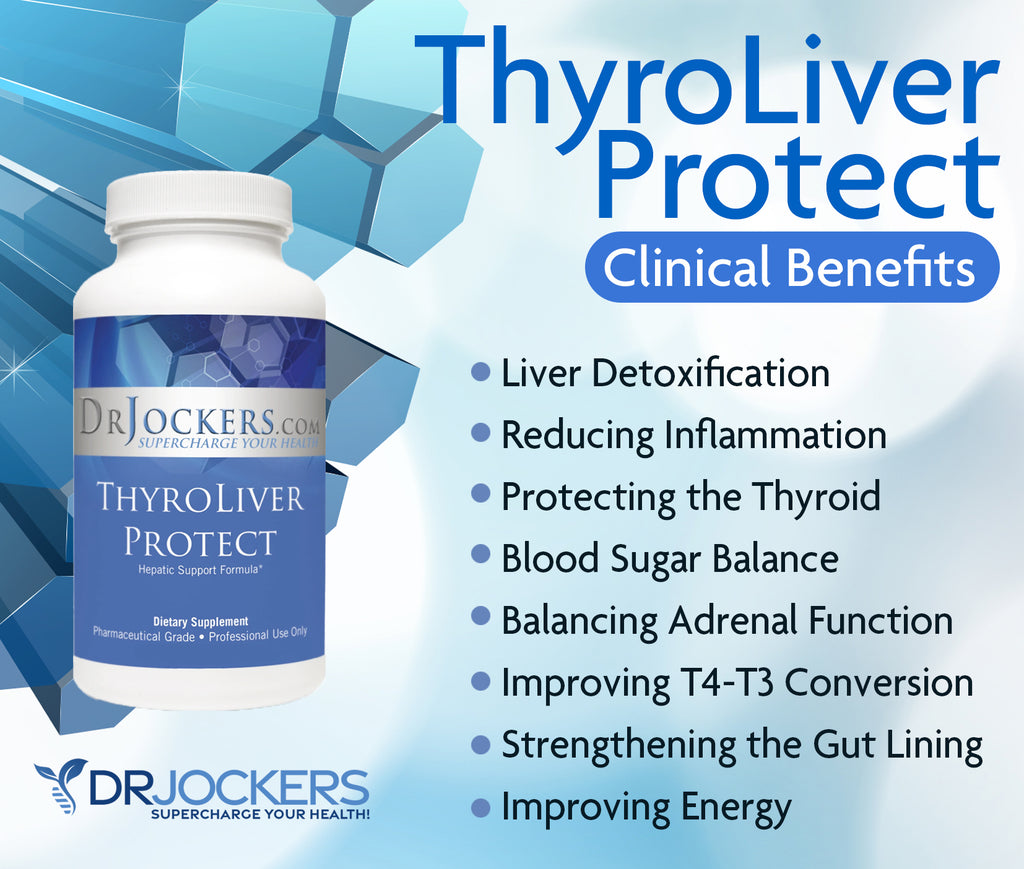






Have you researched bile acid malabsorption due to ileum resection? Wondering what you might recommend to overcome? Thanks.
Hey Carolyn, you could try supplementing with 2-4 grams of activated charcoal throughout the day and see how you respond. Using digestive enzymes may be helpful as well!
i heard of carbon-60 on rense.com have you heard of it? planning to try some..
Thanks for sharing!
The article is very interesting but I had my gallbladder removed few years ago.
What you suggest me to do? My digestion is very low and most of the time I feel swollen after eating.
These same strategies will be helpful for you Ida! You may need to use an Ox Bile supplement as well.
I have an problem with my mom she is now in nursing home. Well before she went in about Nov of 2017 she had several problems physically three things were happening that she had one her kidneys were swollen and her liver counts went up and also she had gallbladder inflammation; but they could not do surgery to remove her gallbladder because she had double bypass heart surgery and a valve replace since 2009. So to avoid complication cause she could died on the operation. Instead of surgery they suggested to put the tube to drain the fluids and it has helped her but she has gotten better but the problem is the tube is irritating her and have tube replace every three months. And that the stones are still in her and one is large one can not go thru the bile duct. Is there anything to dissolved the gallstone naturally so that she can no longer have the tube. I hate to see her in pain because of the tube. I really need your help in this area!
Sincerely,
Scott
Hey Scott, so sorry to hear about your mom. Maybe the information in this article will be helpful: https://drjockers.com/beat-gallstones-naturally/
Hi Scot, sorry to hear about your mum. Please Find a experienced homeopathic practitioner, homeopathic treatment for breaking down gallbladder stones is proven treatment, I know few people who got rid of stones with homeopathic medicine treatment. Doctors told them they have to have operation to remove gallbladder but someone who had homeopathic treatment told them about it. Contact homeopathic doctor and ask.
Regards
Sorry Scott did see the date,
Any supplements/ways to reduce high ammonia blood levels? I don’t drink and eat well, liver enzymes are good, and the few bad bacteria on the GI MAP test are under their limit but have histamine intolerance and strong reactions to most supplements apart from a few. Might ox bile and digestive enzymes help?
Hey Ag, it could also possibly be due to high levels of stress or consuming too much protein. Maybe these articles can be helpful:
https://drjockers.com/much-protein-consume-daily/
https://drjockers.com/7-ways-balance-cortisol-levels/
Hey Dr Jockers..I suffer a lot from heartburn and degistive problem..I had my gallbladder removed 30 yrs ago does this have anything to do with my degistive problem ..regards Betty Thompson …
It might Betty! I would recommend trying taking one of these with meals: https://store.drjockers.com/products/bio-gest
Hey !54 years old nodules from oestrogen dominance more like goiter ! Is any supplements helps ?
I am currently dealing with chronic Lyme disease and all of its co-infections. I’ve struggled with and overcome leaky gut syndrome and candidiasis in the past and try to be super aware of keeping my biosphere balanced. I’m interested in activated charcoal as a cleanser, but worry that it will leave my gut unprotected. I’m really tired of hurting and am ready to make changes to better my health so I can be a more active participant in my family’s daily function.
I have to avoid fermented foods, do you have any recommendations as to how I can incorporate your protocol in my life?
I am anxious to feel better and am already on board with increasing my hydration with pH balanced water.
Thanks for posting such an easily understood article.
– Jenn
Sorry to hear that Jenn!! Here is a helpful article on Lyme: https://drjockers.com/natural-strategies-overcome-lyme-disease/
Will any of this help with steatorheaa?
Yes it will for sure Dave!
Great Article, but I have one question about biliary sludge protocol. Won’t activated charcoal hinder nutrients absorption if taken an hour before meals. Also how many times a day someone should do this? Thank you!
Hi Andrei, When taking with a meal activated charcoal can hinder some nutrient absorption. I recommend taking it an hour before eating to bind toxins.
Hello, I was taking activated charcoal and I think it opened up my ulcer, that with a combination of pepto bismol. Is that possible? I want to start this protocol, but need to heal the ulcer first. Any recommendations to help close the ulcer? I’m taking g glutamine, honey, collagen.
Hi Dr. Jokers, read your article on liver and gallbladder. I am having multiple gallbladder stones of 4 – 5 mm size and suffering from digestion issues for a long time. Doctors have suggested removal of gallbladder which I would like to avoid. I am loosing weight and have problem of malabsorption of food and loose stool. I am now taking homeo medicines and interested in taking your liver and gallbladder support supplements. I am from India and would like to know how to order your supplements. Please let me know the cost and also your advice for getting rid of the stones.
Regards,
Indira
Sorry to hear this Indira. I am not sure if we can ship to India, but you can contact Deb at sales@drjockers.com for more info
I have thrombocytopenia. I have a fatty liver. I have an enlarged spleen. I have had my gallbladder removed. What do you suggest for someone like me?
So very sorry to hear this! I would recommend following the strategies in this article and working with one of our functional health coaches to help customize a specific plan for you: https://drjockers.lpages.co/long-distance-coaching-dr-jockers/
I have recently been diagnosed with PBC and I really want to use your bile flow instead of the ursodiol docs want to put me on to slow progression , bad side effects and I would rather not go on it .
I actually have already bought 4 bottles of bile flow . but I haven’t started it yet. To your knowledge has this anyone used for PBC .
Hello Deb, yes you can use the Bile Flow Support with PBC. I would recommend 2 caps – 2x daily. Blessings!
Hi Dr. Jockers. Thank you for all the info. I have had severe pain mid back for a year, it comes and goes depending on the time of the month. My gallbladder is functioning at an 83% and my lipase enzyme is high. Sometimes it comes with acid reflux, sometimes bloating, sharp pain and I go between normal BM to diarrhea and constipation. Suggestions on how I calm down these organs that are angry? Regular doctors aren’t figuring it out.
Sorry to hear this! I would recommend working with a functional health practitioner. Here is a helpful article on how to find a great health coach: https://drjockers.com/functional-nutrition-tips-to-find-a-great-health-coach/
I had my gallbladder removed a few years ago (worst decision!). I have chronic digestive issues and other symptoms that indicate fat malabsorption. Will the supplements in this article help even though I don’t have a gallbladder?
Yes absolutely and we have a detailed article for you here on what to do to improve digestion after gallbladder surgery. https://drjockers.com/no-gallbladder-strategies/